Questões de Vestibular
Sobre voz ativa e passiva | passive and active voice em inglês
Foram encontradas 67 questões


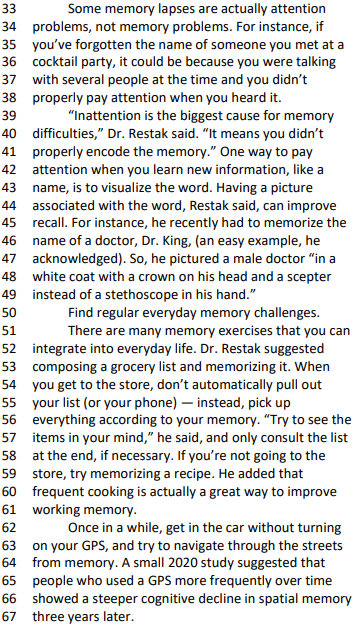
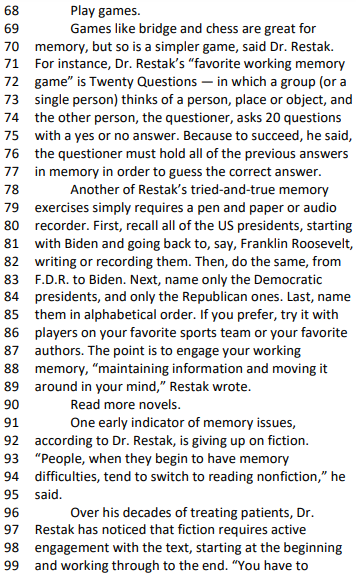

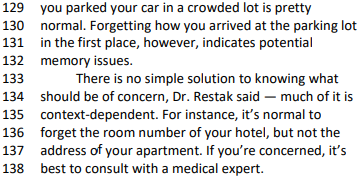
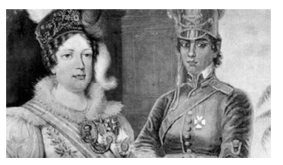
The passage “which they believed was a key factor” (first paragraph) could be correctly rewritten in the passive voice as which was believed to be a key factor, without this changing the meaning and coherence of the text.
Essential reading on, and beyond, Indigenous Peoples Day
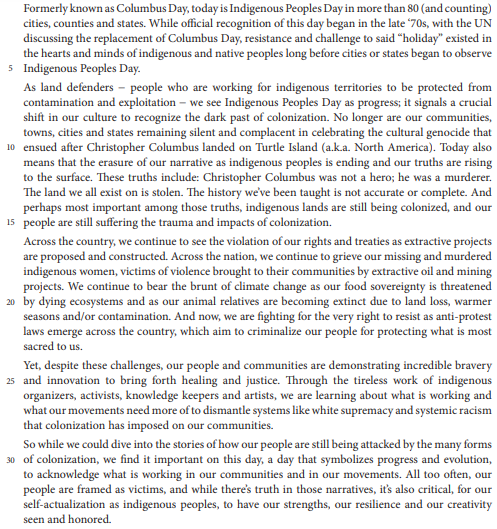
our people are still being attacked by the many forms of colonization, (l. 29-30)
The sentence above exhibits the passive voice.
Another occurrence of the passive voice is underlined below:

https://www.theguardian.com/environment/
2021/sep/27/

https://www.theguardian.com/environment/
2021/sep/27/

Backpacs” (title) - a large bag carried on the back.
“strap” (l. 2) - a strip of leather, cloth or other flexible material.
“lugging” (l. 5) - carrying something with great effort. “prof” (l. 8) - professor.
“sprains” (l. 18) - injuries.
“strains” (l. 18) - severe demands on physical strengh.

TEXTO
The Future Of Work: 5 Important Ways Jobs
Will Change In The 4th Industrial Revolution



Fonte:
https://www.forbes.com/2019/07/15
Read Text to
answer question.
The article analyzes the relationship of Indigenous
Peoples with the public policy of Social Assistance (AS) in Brazil. Based on
data collected during field work carried out in 2014, will analyze the case of
the Indigenous Reserve of Dourados, Mato Grosso do Sul. In the first part, I
characterize the unequal relationship between society and national state with
Indigenous Peoples to, then approach the Welfare State politics as an
opportunity to face the violation of rights resulting from the colonial siege. Then
we will see if Dourados to illustrate the dilemmas and possibilities of
autonomy and indigenous role faced with this public policy. It is expected to
contribute to the discussion of statehood pointing concrete cases where the
local implementation of AS policy is permeable to a greater or lesser extent,
the demands of Indigenous Peoples by adaptation to their social organizations
and worldviews.
(BORGES, Júlio César. Brazilian society has made us poor: Social Assistance and ethnic autonomy of Indiggenous Peoples. The case of Dourados, Mato Grosso do Sul. Horiz. antropol. Disponível em: <http://www.scielo.br/scielo.php?script=sci_abstract&pid=S0104-71832016000200303&lng=en&nrm=iso&tlng=en>. Acesso em: 10 nov. 2018).
Cleir Avila Ferreira Júnior was born in Campo Grande, Mato Grosso do Sul State, Brazil. He is a self-taught artist. He has painted professionally since he was 18 years old. He has begun his artistic works with a hyperrealist influence, where he portrayed some regional and ecological themes, especially the Pantanal nature, presented in almost all his art.
In 1994, he started his mural work on the sides of some Campo Grande’s buildings, as example: the great "Onça Pintada" (50m high and 220m2) took him and his team a month of execution, and the "Tuiuiús" (40m high and 300m2) was his second mural. In 1995, he painted the "Blue Macaw" (45m high and 430m2). In 1996, he built the "Macaws’ Monument" in front of the international airport in Campo Grande, MS. In 1998, he painted a mural of 700m2 in Corumbá, MS, where he portrayed the red macaw in one of its walls and in the other two a big gold fish. Therefore, he did uncountable art around Mato Grosso do Sul State, mainly into the touristic cities.
(FERREIRA JÚNIOR, Cleir Avila. Disponível em: <http://www.artenossaterra.xpg.com.br/index.html>. Acesso em: 10 nov. 2018).
Based on part of the Text II, answer the question: In which verb tense are the following sentences?
“In 1995, he painted the ‘Blue Macaw’ (45m high and 430m2 ). In 1996, he built the ‘Macaws Monument’ in front of the international airport in Campo Grande, MS. In 1998, he painted a mural of 700m2 in Corumbá, MS, where he portrayed the red macaw in one of its walls and in the other two a big gold fish. Therefore, he did uncountable art around Mato Grosso do Sul State, mainly into the touristic cities”.
Leia a tirinha:

Fonte: http://englishteachermargarita.blogspot.com
A construção “... most of our problems are caused by a lack of communication” está na voz passiva.
Assinale a opção que a transforma em voz ativa.
TEXTO 03

“Consumerism is ruining our lives and the world” a voz passiva da frase está CORRETAMENTE construída e sem
alterar o sentido na alternativa:
One of the marked characteristics of scientific texts is the presence of passive voice.
An example from the text that illustrates this characteristic is indicated in:
How World Leaders Reacted to Trump at the U.N.
By SOMINI SENGUPTA and MEGAN SPECIA SEPT. 23, 2017
He was called a “giant gold Goliath” and a “rogue newcomer.” But in a few corners the remarks made by President Trump at the United Nations were described as “courageous” and “gratifying.”
Throughout the week, Mr. Trump’s first address to the General Assembly drew many direct and indirect swipes, from allies and rivals alike, and sparse support.
While the North Korean leader, Kim Jong-un, attacked Mr. Trump from afar — calling him a “dotard” in a statement on North Korean national television — others used their platforms at the United Nations to respond.
Some leaders were more subtle than others.
Robert Mugabe, Zimbabwe’s 93-year-old president, took aim at Mr. Trump during his own speech on Thursday. Mr. Mugabe mocked Mr. Trump as a “giant gold Goliath” and said other nations were “embarrassed if not frightened” by his statements about North Korea.
“Are we having a return of Goliath to our midst, who threatens the extinction of other countries?” Mr. Mugabe asked. Some responded with applause to his reference to the biblical character who threatened the Israelites before being slain by the young shepherd David, who would become king.
Mr. Mugabe then went on to address Mr. Trump directly, telling him to “blow your trumpet in a musical way towards the values of unity, peace, cooperation, togetherness and dialogue which we have always stood for.”
During his speech, Mr. Trump notably omitted any talk of climate change, seen as one of the most pressing issues for many world leaders.
Prime Minister Justin Trudeau of Canada received the longest applause during his General Assembly speech on Thursday after an implicit dig at Mr. Trump.
“There is no country on the planet that can walk away from the challenge and reality of climate change,” Mr. Trudeau said, referring to Mr. Trump’s plans to pull out of the Paris climate accord.
(Adapted from https://www.nytimes.com/2017/09/23/world/americas/world-leaders-trump-un.html?mcubz=0)
Turn the active voice into passive voice:
Mr. Trump notably omitted any talk of climate change




